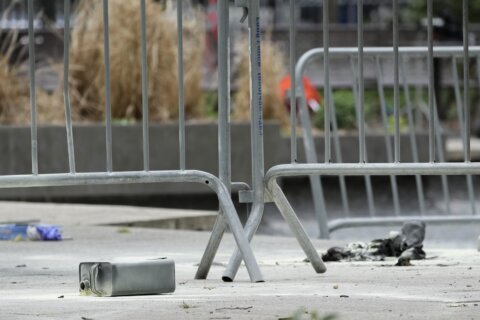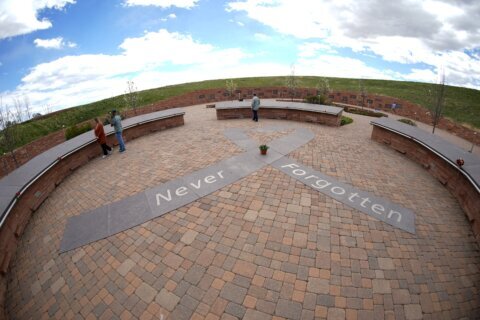As the remaining rubble from the collapse of a 12-story oceanfront condominium was cleared away Wednesday, a Florida judge said victims and families who suffered losses will get a minimum of $150 million in compensation initially.
That sum includes about $50 million in insurance on the Champlain Towers South building and at least $100 million in proceeds from the sale of the Surfside property where the structure once stood, Miami-Dade Circuit Judge Michael Hanzman said at a hearing.
“The court’s concern has always been the victims here,” the judge said, adding that the group includes visitors and renters, not just condo owners. “Their rights will be protected.”
The $150 million does not count any proceeds from the numerous lawsuits already filed since the June 24 collapse, which killed at least 97 people. Those lawsuits are being consolidated into a single class action that would cover all victims and family members if they choose, the judge said.
“I have no doubt, no stone will be left unturned,” Hanzman said of the lawsuits.
So, far 97 victims have been identified, many of them using DNA analysis. Miami-Dade officials had said Wednesday evening they believed they have two more victims to identify, but another person’s name was released later in the day — meaning there may be just one more.
Officials have not yet announced an end to the recovery effort.
Meanwhile, the site of the tragedy has mostly been cleared away with the debris relocated to an evidentiary collection site near the airport where a thorough search will continue “with enormous care and diligence,” said Mayor Daniella Levine Cava.
She spoke about the difficulties of the search in a statement Wednesday.
“The enormous pressure of the weight of the collapse and the passage of time also make it more challenging,” she said, stressing that workers were still carefully combing through the rubble for the remaining victims as well as personal property and religious artifacts.
On Wednesday, police said 24-year-old Anastasia Gromova and Linda March, 58, were identified.
Gromova, a Canadian from Montreal, had just been accepted to a program teaching English in Japan and was visiting the condo for one last hurrah with friend Michelle Pazos. Gromova’s body was recovered three days ago and was one of the last to be identified.
Her grieving family rushed from Canada after the collapse and had spent weeks in agony waiting in Miami.
“It just makes it real and hard but on a different level. At least we can move on now,” her sister Anna Gromova told The Associated Press, describing her sister as a bright star that fell fast. “We will remember her forever.”
Her parents said she was bright, always on the go, constantly smiling and unafraid to take on difficult challenges.
“It’s hard because you knew the loss was preventable and still nothing was prevented,” her sister said.
March’s body was recovered July 5, police said. Earlier this year, the successful attorney rented the furnished penthouse where pictures of white bunk beds hanging precariously close to the sheered off building made national headlines.
March, described as an outgoing person, had lost both her parents and sister in the past decade and had gotten a divorce and was looking for a new start in Miami, friends said.
The rubble that will be key evidence is being stored in a Miami-area warehouse, with the rest in nearby vacant lots, said the receiver, attorney Michael Goldberg. All of that will be preserved as possible evidence for the lawsuits and for other experts to review, he said.
The National Institute of Standards and Technology is leading a federal probe into the collapse, according to a receiver handling the finances on behalf of the condominium board.
“It may take years for their report to become public,” Goldberg said of the NIST probe.
The building was just undergoing its 40-year recertification process when it collapsed. That came three years after an engineer warned of serious structural issues needing immediate attention. Most of the concrete repair and other work had yet to be started.
There remain differences of opinion among condo owners about what to do with the site. Some want the entire condo rebuilt so they can move back in. Others say it should be left as a memorial site to honor those who died. A third suggestion is to combine both.
Owner Raysa Rodriguez, whose unit was on the ninth floor, said she couldn’t imagine going back into a building in a place where so many friends died.
“I personally would never set foot in a building. That’s a gravesite,” Rodriguez told the judge. “I wake up in the middle of the night thinking of everyone who perished.”
Oren Cytrynbaum, an attorney who is informally representing some fellow condo owners, said it was important to think creatively about the building sale, including whether requirements might be added such as a memorial of some kind for future developers.
“It shouldn’t be a traditional land sale,” Cytrynbaum said. “We’re not on one path.”
Hanzman, however, said time is of the essence because victims and families need money to begin rebuilding their lives.
“This is not a case where we have time to let grass grow underneath it,” he said.
__
Associated Press writer Kelli Kennedy contributed to this report from Fort Lauderdale, Florida.
Copyright © 2024 The Associated Press. All rights reserved. This material may not be published, broadcast, written or redistributed.







